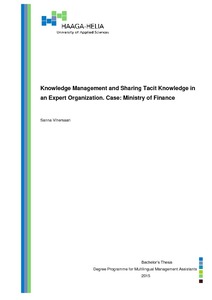Knowledge Management and Sharing Tacit Knowledge in an Expert Organization. Case: Ministry of Finance
Vihersaari, Sanna (2015)
Vihersaari, Sanna
HAAGA-HELIA ammattikorkeakoulu
2015

Creative Commons Attribution-NonCommercial-ShareAlike 1.0 Suomi
Julkaisun pysyvä osoite on
https://urn.fi/URN:NBN:fi:amk-201503193365
https://urn.fi/URN:NBN:fi:amk-201503193365
Tiivistelmä
Knowledge management and sharing are both important parts of most any organization, and an asset to employees. The sharing of tacit knowledge has become increasingly important, because it cannot be handled as data by computer based systems.
The Ministry of Finance has acknowledged that knowledge, especially tacit knowledge, is an important part of defining any their work and knowledge base. Since tacit knowledge is something that cannot be stored in databases, the practices of sharing it or passing it on are extremely important.
The aim of this study was to define the optimum practices for knowledge sharing, as well as for knowledge based teamwork. It also defines and recognizes coaching and mentoring as part of effective knowledge creation and sharing policies.
It then looks into these practices and how the Ministry of Finance is encouraging and implementing such policies in order to stimulate knowledge creation, recognize tacit knowledge and share knowledge among employees. The thesis also evaluates how the practices are actually implemented and if they are working the way they were intended to work.
The research was implemented as a traditional qualitative research, carrying out themed interviews among selected employees of the Ministry.
The Ministry of Finance has acknowledged that knowledge, especially tacit knowledge, is an important part of defining any their work and knowledge base. Since tacit knowledge is something that cannot be stored in databases, the practices of sharing it or passing it on are extremely important.
The aim of this study was to define the optimum practices for knowledge sharing, as well as for knowledge based teamwork. It also defines and recognizes coaching and mentoring as part of effective knowledge creation and sharing policies.
It then looks into these practices and how the Ministry of Finance is encouraging and implementing such policies in order to stimulate knowledge creation, recognize tacit knowledge and share knowledge among employees. The thesis also evaluates how the practices are actually implemented and if they are working the way they were intended to work.
The research was implemented as a traditional qualitative research, carrying out themed interviews among selected employees of the Ministry.
